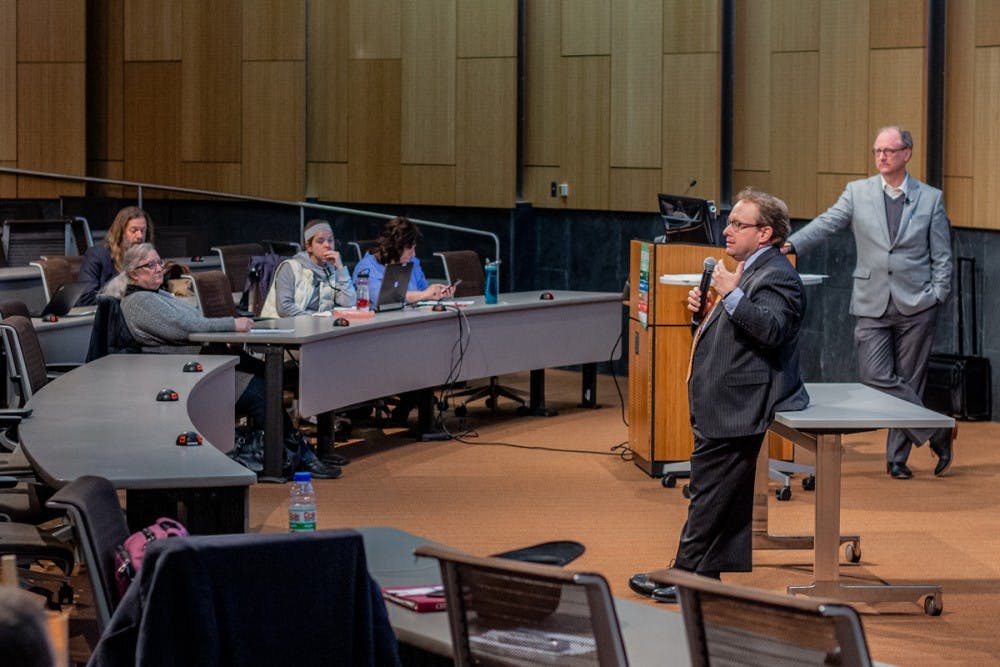Academic Senate debates implementation date of changes to B.S., B.A. degrees
Davies addresses size of CMU and updates Senate on the provost search

Central Michigan University's Academic Senate gathers in the College of Education and Human Services French Auditorium Feb. 26.
Central Michigan University Academic Senate made several curricular changes at its Feb. 26 meeting in the College of Education and Human Services French Auditorium.
The main topic of discussion was previous proposed changes to the Bachelor of Science and Bachelor of Arts degrees. The undergraduate curriculum committee wanted to change the implementation date of the new degree programs to Fall 2020 instead of Fall 2019. Senator Ed Simpson, department of journalism faculty, said the committee wanted to take more time to assess how the changes will affect students who are not in traditional science majors.
The change to the Bachelor of Science degree includes eliminating the area requirements and instead requiring nine credits of 300-level or higher courses in a natural or social science designator. A similar change to the Bachelor of Arts degree would eliminate the area requirements and only keep the foreign language requirement.
The committee was worried about “hidden prerequisites” that come with the B.S. degree. Simpson said students that aren’t in a science major and students that are taking a science minor cannot fill the requirement without taking additional courses. He also said Global Campus students would also struggle to fill the requirement because there are not as many 300-level or higher science classes offered online.
Currently, the vast majority of students choose the B.S. degree over the B.A. to avoid the foreign language requirement.
Senator Ben Heumann, department geography and environmental sciences faculty, was one of the faculty members who created the original proposal. He said the changes shouldn’t be a problem because it will be easier for science majors, and many majors that currently offer a B.S. degree are not the best fit and should consider a B.A. degree instead. Senator Tracy Davis, department of English language and literature faculty, agreed and explained that the best time to learn a foreign language is before the age of 25.
Senator Michael Mamp, department of human environmental studies faculty, supported the delay.
“The B.S. had (added) good content but the B.A. has eliminated content,” Mamp said. “I haven’t liked how this worked out for the B.A. degree from the start.”
In the end, the Senate voted against the delay, so the new B.S. and B.A. requirements will be implemented in Fall 2019. The change will not affect students who have already signed a major and chosen a degree.
During the his report, President Robert Davies addressed enrollment again and said CMU needs to find its place in Michigan.
“We are a national, leading research university, but we are not a behemoth,” Davies said. “We have opportunities to have faculty and students interact, both at the graduate and undergraduate level.”
He said that while he wants CMU to continue offering a wide range of programs and degrees, he doesn’t want to overwhelm students with possibilities like large institutions do, including Michigan State University and University of Michigan.
Davies also updated the Senate on the search for CMU’s next provost. The search committee is set to meet March 8 and hopes to have finalists on campus a few weeks before finals.
The Senate approved the deletion of the Chemistry-Physics education major, which has been on hiatus for two years. The professional education curriculum committee motioned to delete the major because no student has enrolled in the program since 2013.
The graduate committee proposed changes to two programs: athletic training and statistics.
The Senate approved the motion to implement an “Entry-Level Master” (ELM) degree in the athletic training program. To meet accreditation standards, athletic training programs are required to grant a master’s degree instead of a bachelor’s degree. The new program will be a five-year ELM that includes three years of undergraduate courses resulting in a bachelor’s degree and two years of graduate courses that will lead to a master’s degree in athletic training.
Another change that was approved by the Senate was changing the Ph.D. in Mathematical Sciences with a Statistics concentration to a Ph.D. in Statistics and Analytics. This change is in line with the reorganization of the College of Science and Engineering, which separated statistics from the mathematics department. The main curricular changes will remove some mathematics courses from the requirements and add more statistics courses.






